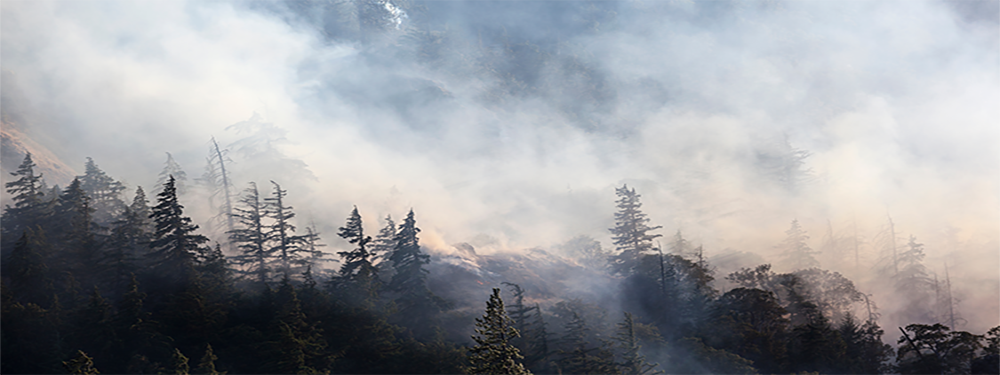Stay healthy during elevated smoke periods and be fire smart

Wildfires are becoming more prevalent, devastating, and enduring in British Columbia. Wildfire smoke is a seasonal hazard for many BC residents.
UBC Okanagan is a fire-smart campus and follows the recommendations set out in UBC Wildland Fire Management Plan for improving fire safety on campus.
Note: All air coming into Okanagan campus buildings through air intakes is filtered. To ensure that the air-handling systems can work efficiently, please keep all windows and doors to the outside closed.
Monitor your health during elevated wildfire smoke periods
What are the risks and health hazards associated with exposure to wildfire smoke?
Wildfire smoke is defined as a complex combination of fine particulate matter and chemical gases. Some particulates in wildfire smoke can be particularly harmful as they can penetrate deeper into the respiratory tract.
People may feel mild exposure symptoms such as a sore throat, shortness of breath, and irritated eyes. Wildfire smoke may cause headaches and worsening allergies. An individual that feels difficulty breathing or coughing should discuss concerns with their health care provider.
The potential for long-term health effects from wildfire smoke is highly variable person to person. Age, individual susceptibility, level and duration of smoke exposure are all factors that influence the potential for long-term health effects.
The level of risk from wildfire smoke exposure depends on:
- Time spent outdoors when smoke levels are high
- Activities being performed (i.e. physical activities will lead to inhaling more air)
- The duration of the outdoor activity being performed
- The type of air filtration used indoors
How to be safe during wildfire smoke periods?
People who spend a lot of time outside are particularly affected by wildfire smoke. Performing physical exertion outdoors can increase air intake up to 20 times. Wildfire smoke can also contribute to heat stress and low visibility risks.
General Guidance
- Identify and evaluate where the potential for exposure to wildfire smoke exists.
- Become familiarized with the local Air Quality Health Index for obtaining health risk levels.
- Real-Time Okanagan Air Quality Health Index Map
- BC Air Quality Index
-
-
- Note: BC will release air quality advisories to help determine and implement appropriate risk controls
-
-
- Canada Air Quality Index
- Stay informed about the hazards, exposure signs and symptoms of wildfire smoke.
- Educate yourself on the risks of wildfire smoke and how to stay safe. See additional resources below.
Wildfire prevention tips
By following these tips, we can all do our part to prevent wildfires and keep our communities safe.
- Follow burn bans! During dry and windy weather conditions, authorities may issue burn bans. It’s important to follow these bans to prevent accidental fires.
- Report unattended fires. If you see a fire, report it immediately to the authorities. Early reporting can prevent a small fire from becoming a large, destructive blaze.
- Check weather and drought conditions
- Don’t throw cigarettes. Always dispose of cigarettes in an ashtray or designated container.
- Build your campfire in an open location and far from flammables
- Douse your campfire until it’s cold
- Keep vehicles off dry grass
- Keep sparks away from dry vegetation
FireSmart™ is about living with and managing wildfires in your area. Becoming wildfire resilient is a shared responsibility across BC. FireSmart™ principles have shown that they are effective at reducing the risk to life and property in the most extreme wildfire conditions. The FireSmart™ program is backed by a vast amount of field, laboratory and wildfire modelling research. Its methods help reduce the risk of losses under even the most extreme fire conditions.
Report a wildfire
If you witness a wildfire or notice any careless behavior that might lead to a wildfire in British Columbia, please call 1 800 663-5555 or (*5555 from a mobile phone) without delay. The prompt sharing of information from the public is essential for the success of the response efforts.

